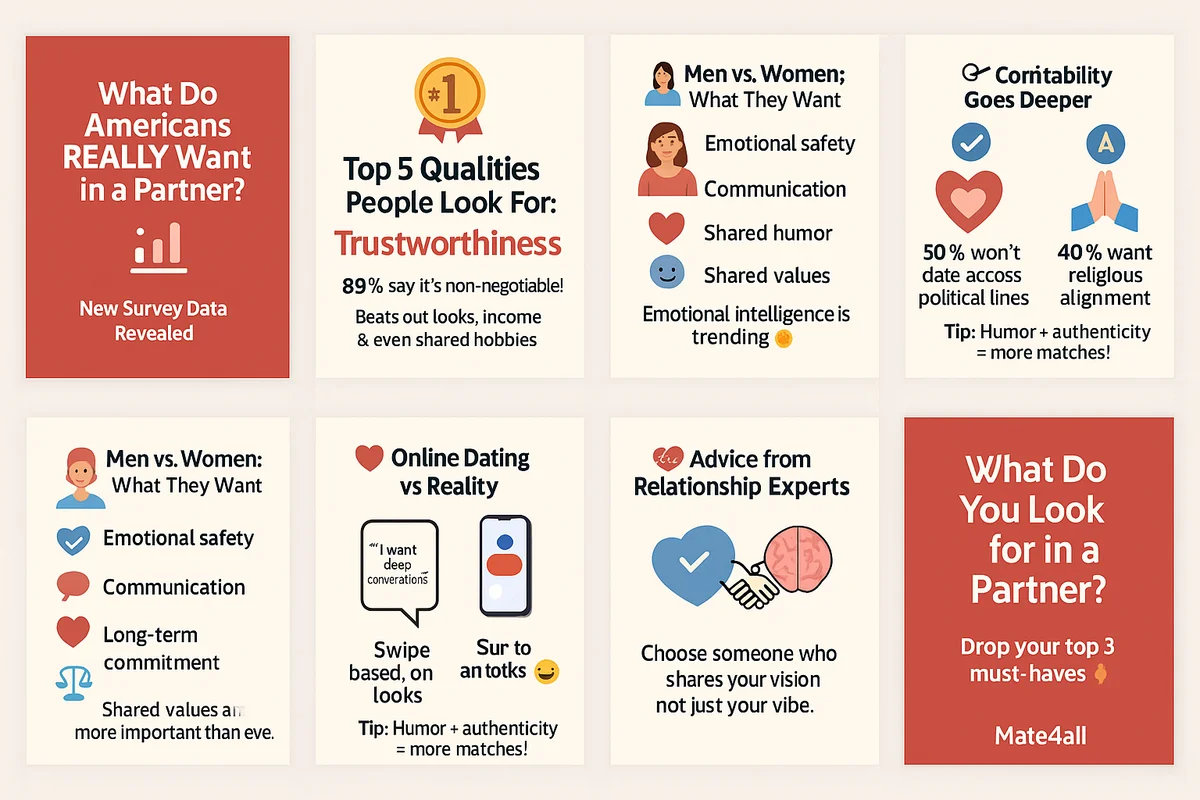
When it comes to love, are Americans really as shallow as Hollywood rom-coms suggest—or is there more to the story? A recent deep dive into national dating preferences reveals surprising truths about what people actually look for in a partner. Whether you’re swiping through dating apps or searching for a soulmate offline, understanding what Americans value most can give you a major edge in today’s relationship market.
Let’s explore what the data says about modern love in the U.S.
Top Qualities Americans Value Most in a Partner
If you think looks are everything, think again.
According to recent surveys from Pew Research Center and Match.com’s annual Singles in America study, the most desired trait in a partner is trustworthiness, followed closely by communication skills, emotional availability, and shared values. Physical attraction still matters—but it’s no longer the top priority.
Top 10 Most Desired Partner Traits (Survey Highlights):
- Trustworthiness – 89% of respondents
- Good communication – 86%
- Emotional availability – 78%
- Shared sense of humor – 75%
- Shared values or beliefs – 73%
- Kindness – 71%
- Physical attraction – 68%
- Financial stability – 60%
- Ambition – 52%
- Compatibility in lifestyle – 50%
Interestingly, emotional intelligence and humor are rising in importance, especially among younger adults.
How Preferences Vary by Age, Gender, and Region
Dating isn’t one-size-fits-all. Different age groups and demographics prioritize different qualities.
By Age Group:
- Gen Z and Millennials value emotional connection, mental health awareness, and political alignment.
- Gen X and Boomers place higher importance on stability, loyalty, and shared life goals.
By Gender:
- Women prioritize emotional safety, communication, and long-term potential.
- Men still value physical attraction slightly more, but emotional compatibility is climbing in importance across all ages.
By Region:
- West Coast: More open to non-traditional relationship styles; higher emphasis on shared lifestyle.
- Midwest/South: Greater focus on religious alignment, family values, and long-term commitment.
The Growing Impact of Values, Politics, and Religion
Modern daters aren’t just looking for chemistry—they’re seeking alignment on deeper issues. According to Pew Research, over 50% of singles say they wouldn’t date someone with opposing political beliefs, and nearly 40% consider religious compatibility essential.
In a polarized cultural climate, compatibility often extends beyond shared interests. People want partners who see the world similarly—and that’s changing how singles approach dating.
Online Dating vs Real-Life Expectations
Apps like Mate4all make it easier than ever to meet people—but do users always look for what they say they want?
Behavioral data from apps like Tinder and Bumble show that:
- People often swipe based on photos, even though surveys say personality is more important.
- Profiles with descriptions highlighting kindness, hobbies, and humor get more likes.
- Users who message quickly and ask meaningful questions tend to build stronger connections.
This disconnect between stated preferences and swiping behavior is called the “intention-action gap”—and it’s very real.
Traits That Predict Long-Term Relationship Success
When it comes to lasting love, certain traits stand out. According to the American Psychological Association, couples who report the highest relationship satisfaction consistently share the following:
- Mutual respect and admiration
- Open, honest communication
- Ability to resolve conflict
- Support for each other’s goals
- Shared future vision
Couples therapy data also shows that these traits are better predictors of success than attraction or financial status alone.
Expert Advice: What Should You Actually Look For?
We asked relationship therapists and dating coaches what they recommend prioritizing based on the data.
Top 3 Tips From Experts:
- Don’t settle for charm—look for consistency.
- Emotional availability matters more than looks.
- If your values don’t align, your goals probably won’t either.
A relationship coach from California puts it this way:
“Compatibility is about how two people handle life together. It’s not just about having fun—it’s about having each other’s back.”
Conclusion: What This Means for the Future of Dating
The American dating landscape is changing. What used to be a game of attraction is now a quest for emotional connection, value alignment, and long-term potential. Whether you’re dating online or meeting people organically, knowing what others want—and what you want—is the first step to building something real.
Mate4all is here to help you find matches who are not just attractive but also truly compatible. Start by updating your profile with the traits that actually matter—because someone out there is looking for exactly what you have to offer.
FAQs
Q1: What’s the most important trait in a partner according to Americans?
Trustworthiness is ranked as the #1 most desired trait.
Q2: Do dating preferences change by age?
Yes. Younger adults value emotional intelligence and political compatibility more, while older adults prioritize stability and shared life goals.
Q3: Is physical attraction still important?
Yes, but it’s not the top priority. Emotional connection and shared values are ranked higher.
Q4: How does online dating affect partner preferences?
While people say they value personality and communication, many still swipe based on appearance—highlighting a gap between intentions and actions.



